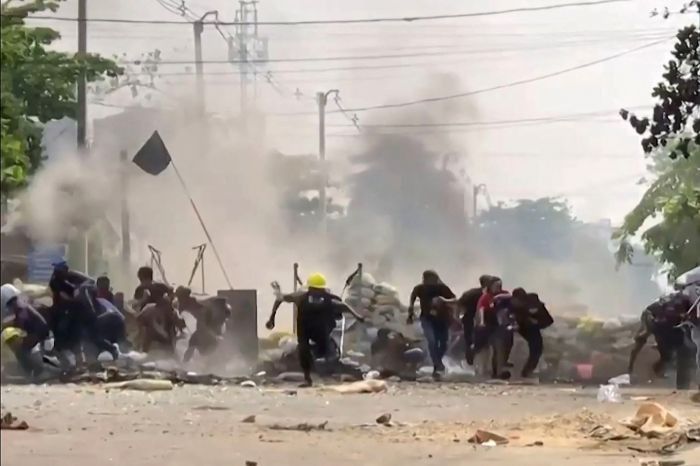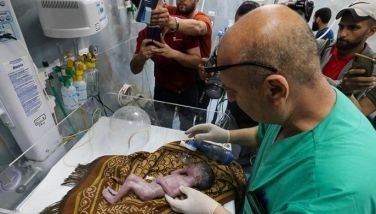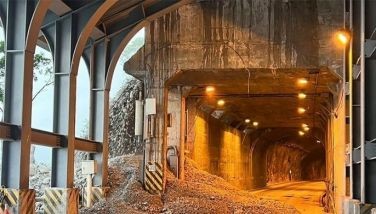Myanmar's ethnic armed groups explained

YANGON, Myanmar -- Unrest in coup-hit Myanmar has thrown the spotlight on some of the country's armed ethnic groups, as three of them threaten the junta with retaliation for its deadly crackdown on protests.
Some analysts are warning that the crisis could spiral into even more conflict if the insurgents follow through on their threats.
Here's a breakdown of how some of the myriad armed groups fit into the Myanmar puzzle.
Who are the rebels?
Independence from British colonial rule in 1948 left a complex patchwork of cultural, ethnic and linguistic groups in Myanmar.
In the decades since, a messy struggle has worn on in different regions over autonomy, ethnic identity, drugs, jade and other natural resources.
The conflicts have pitted rebel groups against the Myanmar military, which is dominated by the Bamar ethnic group.
Now, an estimated one-third of Myanmar's territory -- mostly the border regions -- is controlled by 20-odd armed rebel outfits, according to the International Crisis Group.
Key groups include the United Wa State Army, the Karen National Union, the Kachin Independence Army, the Arakan Army, the Ta'ang National Liberation Army and the Myanmar Nationalities Democratic Alliance Army.
Since 2015, 10 armed groups have signed a nationwide ceasefire agreement with the civilian government after Myanmar's tentative democratic transition following decades of military rule.
But fighting continued in some pockets, particularly Kachin and Shan states in the north, and Rakhine state in the west, often with civilians trapped in the middle.
The Kachin conflict has continued since 2011 after a 17-year ceasefire broke down, displacing at least 100,000 people. And in Rakhine, years of fighting between the Arakan Army (AA) and the military has killed hundreds and forced more than 200,000 to flee their homes.
With a standing force of 25,000, the China-backed United Wa State Army is one of the world's largest non-state militaries.
But it largely sticks to its autonomous enclave on the northern border and has so far had little involvement in the aftermath of the coup.
Shan State is home to several organizations allowed unofficial autonomy in an uneasy agreement with Myanmar's military.
It is also home to much of Myanmar's methamphetamine production -- reportedly a key source of income for some rebel groups.
How have the rebels responded to the coup?
Several rebel groups were swift to condemn the February 1 coup which ousted civilian leader Aung San Suu Kyi.
The Karen National Union (KNU), the oldest insurgent group in Myanmar, said the coup would harm the country.
And the Restoration Council of Shan State (RCSS) in the north said the military had violated "all norms of democracy" and could not be trusted.
As the junta cracked down hard on anti-coup protests over recent weeks, hundreds of people fled to eastern areas controlled by the KNU, who sheltered them.
Over the weekend, the junta launched airstrikes in Karen state -- the first such strikes in 20 years -- targeting the Fifth Brigade of the KNU after the group seized a military base.
On Tuesday, three groups -- the Ta'ang National Liberation Army, the Myanmar Nationalities Democratic Alliance Army and the Arakan Army -- issued a joint statement threatening retaliation over the ongoing military repression of protests, which led to more than 500 civilian deaths.
Where could this lead?
The ICG describes the Arakan Army as an effective fighting force that has inflicted "heavy casualties" on the Myanmar military in Rakhine state.
Debbie Stothard of the International Federation for Human Rights (FIDH) warned that if rebel groups such as the Arakan Army followed through on their new threats, the situation could degenerate towards civil war.
"On the one hand, the junta does not want to give in and on the other hand, demonstrators who were largely peaceful until now are tempted to call for help from the armed rebel groups to protect themselves," she told AFP.
- Latest
- Trending

































